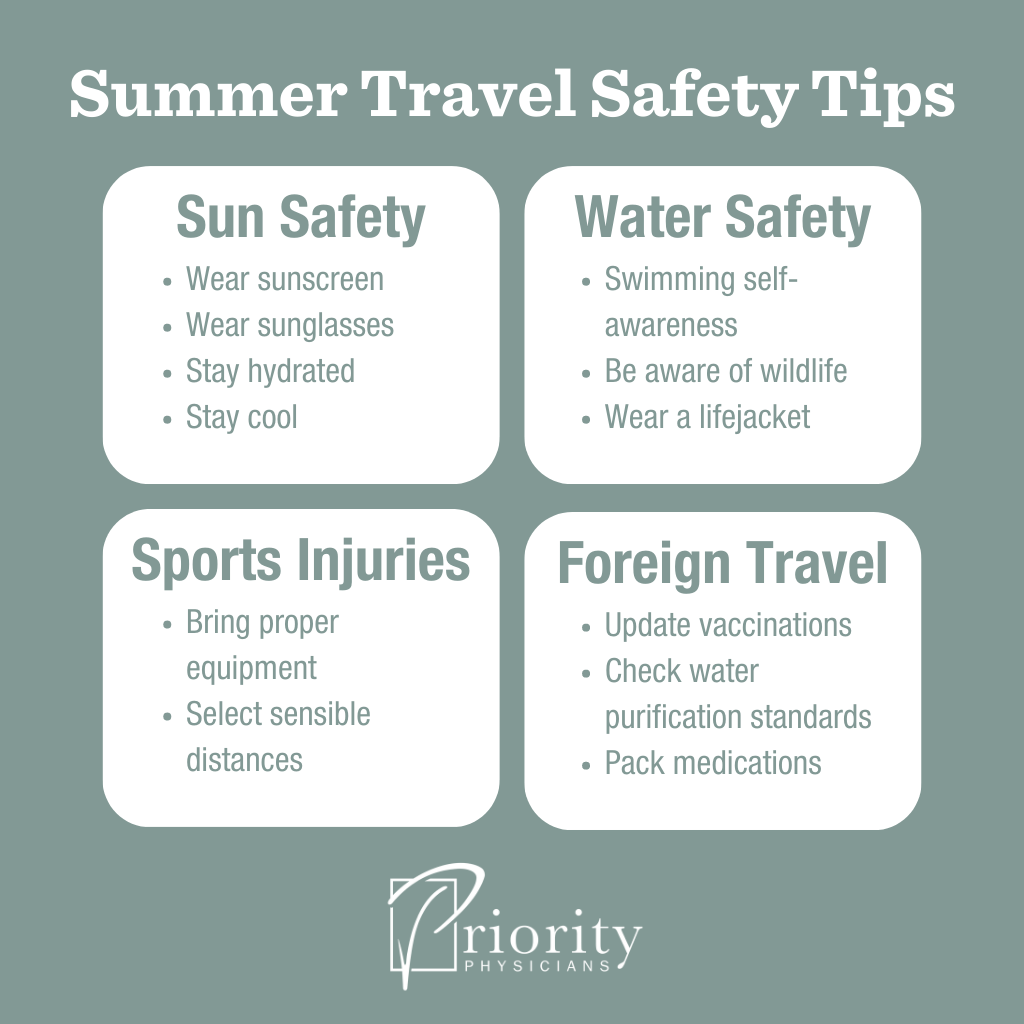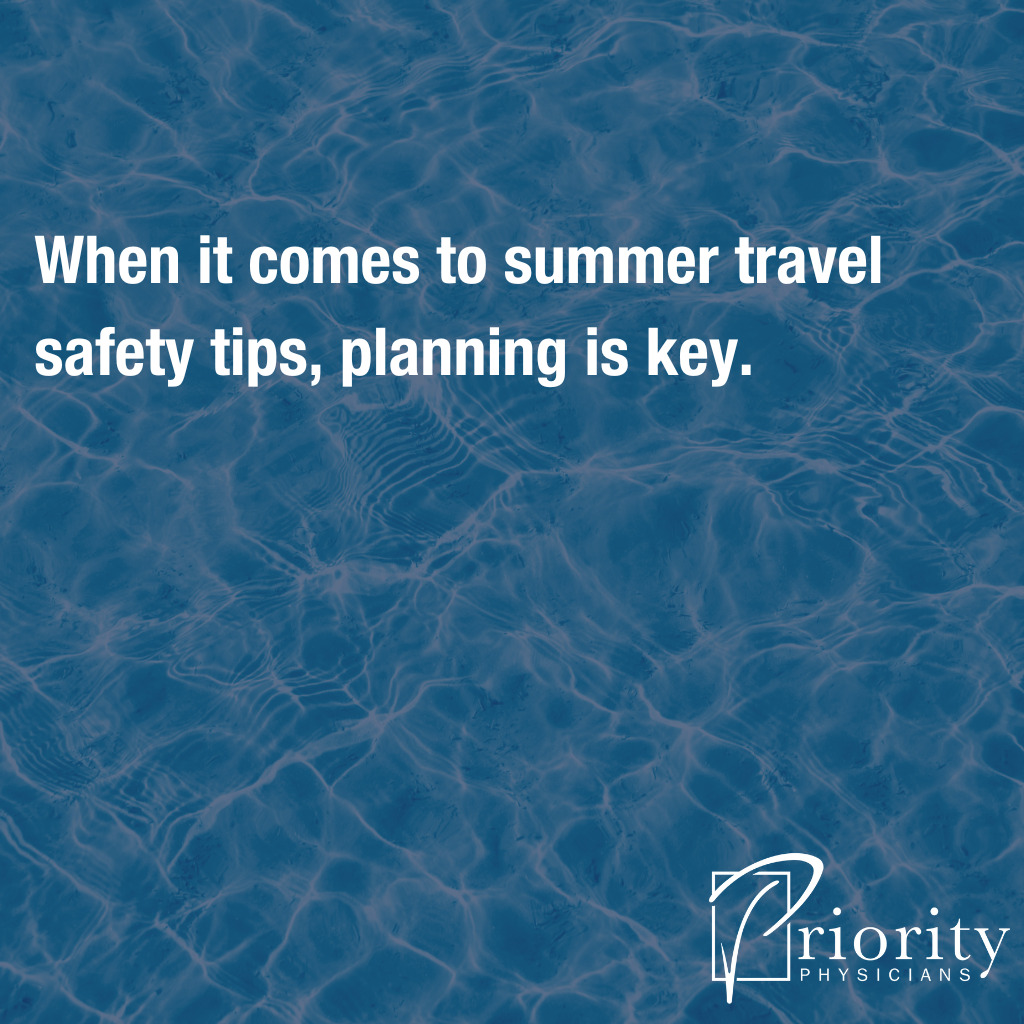If you’re like most Americans, you spend all year looking forward to your summer vacation. You also know how easy it is for those summer vacation plans to be derailed by unexpected problems.
From overbooked hotels to flight cancellations to global pandemics (thank you, COVID!), your carefully crafted itinerary can hit countless roadblocks. You might buy travel insurance to protect your trip against some of these challenges, but what are you doing to protect yourself against a preventable health issue?
If you want to keep your long-awaited vacation on track and prevent the preventable, follow these summer travel safety tips.

4 Summer Travel Safety Tips
Summer Travel Safety Tip #1: Sun Safety
Even if your upcoming vacation won’t feature a picture-perfect white sand beach, wear sunscreen. You don’t need to lounge by the ocean to reap the benefits of applying — and frequently reapplying — sunscreen. Make sure you cover your entire body in the process, including oft-forgotten areas like the back of the ears and legs.
Sunscreen doesn’t just prevent immediate sunburns. It can also keep you from suffering from the long-term effects of sun exposure, such as skin cancer and early visible signs of aging.
Extensive sun exposure can also increase your risk of cataracts, so don’t forget about your eyes when you’re considering sun safety. Wear sunglasses to minimize your chance of developing a serious optical condition down the road.
Also be cognizant of your hydration level. If you’re outside for extended periods of time in warm weather, you’re going to burn through more fluids — which is especially true if you’re drinking alcohol. Drink water throughout your trip to avoid the unpleasant side effects of dehydration.
Finally, heat exhaustion is a legitimate condition, as it can lead to heat stroke. Be conscientious about how your body is faring in your new climate, and don’t be afraid to put your plans on pause in the name of cooling off.
Summer Travel Safety Tip #2: Water Safety
You might hop in the water to cool down on a hot day, but that dip brings its own set of preventable health risks.
First and foremost, be self-aware about your swimming capabilities. There’s no shame in being a mediocre swimmer, but there are risks to consider if you choose to swim in open water without strong skills.
If your vacation involves a trip to the ocean, there are some critters you need to keep an eye out for. Sharks are a pretty slim threat depending on your location, but the much more common jellyfish and sea urchins can change your day for the worse.
Also consider the creatures you can’t see. Not to be confused with rip tides, red tides are cultures of bacteria that exist in bodies of water. Observe local warnings to inform your daily itineraries.
Also, take an extra level of precaution if your vacation involves time on a boat. To minimize safety risks, take that trip around the bay with someone who knows the water well and can adapt if rapid weather changes alter your plans.
In general, be careful about alcohol consumption while on the water (dehydration risks apply on boats, too!) and commit to wearing your lifejacket. Just like helmets on motorcycles, lifejackets have come a long way in terms of design and can even earn you a few fashion points. Oh, and they can save your life.
Summer Travel Safety Tip #3: Sports Injuries
Even if you’re active at home, a vacation might not be the best time to try a new sport or activity. The perils of overexertion, including sprained ankles and broken bones, still apply in a different zip code.
It’s also important to be properly equipped if your trip features outdoor activities like hiking. The correct shoes, gear, and supplies aren’t “nice-to-haves” — they’re essentials. Likewise, make sure you have technology-independent navigation, and tell others about your route.
Also ensure you’re selecting sensible distances for hiking, walking, etc. While you may be more than physically equipped to handle the outbound portion of your trip, keep in mind that you’ll need just as much — if not more — energy to get back.
Summer Travel Safety Tip #4: Foreign Travel
If your travels take you abroad, planning for new customs and protocols is key. On top of planning your itinerary and what you’ll need to pack, check in with your doctor.
Make sure you’re up-to-date on any vaccinations that are recommended for your destination. Some vaccine series and boosters may be required or strongly recommended for entry that aren’t mandatory in the United States. Talk to your doctor before traveling abroad to make sure you’re fully protected.
Abroad, food may be prepared differently than your body is used to. Take any necessary precautions to avoid food poisoning or allergens when selecting your next bite. Also check the water purification standards of your destination to avoid easily preventable (but very unpleasant) water-borne illness.
Finally, healthcare systems abroad are different. Hopefully you won’t need to deal with a medical emergency, but you could still suffer from minor injuries or pains on your trip. Translating medication labels probably isn’t on your itinerary — and the last thing you want to do is run out of medication with no easy way to get a refill.
Don’t make assumptions about over-the-counter drugs while abroad. Instead, pack your own medications to bring with you. Consult with your physician about preparing a travel kit with the most common medications you might need. This is a service we often provide for our members, so take advantage if it’s relevant.

Summer Travel Safety Tips: Final Thoughts
When it comes to summer travel safety tips, planning is key. With a little preparation, you can prevent some of the most common health hiccups while traveling and enjoy your vacation to the fullest!

